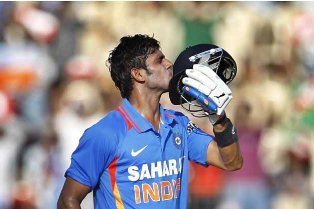
India's first couple of games against the hosts Sri Lanka have produced two results, which are poles apart. Where the first ODI at Hambantota was dominated by Indian batting, the second one at the same venue saw a sorry collapse as the World champions were bundled out for a meagre 133 inside 34 overs.
Although MS Dhoni has gone on the record blaming the Hambantota pitch for the comprehensive loss, nothing can deny the poor batting display by India. Where the likes of Virender Sehwag and Virat Kohli went on a rampage demoralising the bowlers in the first ODI, the second ODI saw Indian batsmen struggling for runs and unable to stitch partnerships. The middle order, especially Rohit Sharma, once again failed to make it count when either Rohit or Suresh Raina should have stepped up to the plate and supported Gautam Gambhir.
The idea of India going in with five frontline bowlers isn't something MS Dhoni is used to, but it seems he is using it to compensate for rustiness while opening a fresh season. Zaheer Khan looks half as good which is expected as he makes a comeback into international cricket after a long gap, while Umesh Yadav continues to leak runs besides generating some pace. Yadav had figures of 10-0-76-2 and 4-0-38-0 in the first two ODIs, repectively. So while Dhoni isn't comfortable with five bowlers in the side, one expects India to continue with that on wickets where mostly batsmen call all the shots.
The villains are definitely turning out to be Rohit Sharma and Umesh Yadav. Rohit, who always thrives in the IPL, is time and time again wasting opportunities in India colours. Manoj Tiwary, who scored a century in his last international outing, is still waiting in the wings.
Despite being a prolific batsman, Tiwary is also swift in the field. So his inclusion in the playing XI for the third ODI can't be ruled out. Bottom line: drop Rohit!
Another option is Ajinkya Rahane, who also happens to be one of the top run-getters in this year's IPL. But playing Rahane might not be easy as he is more of an opening batsman. And the bigger question is if he has to get a place in the side, who should be dropped? That effectively means either Tiwary or Rahane can play in place of Rohit.
As far as the bowling is concerned, Umesh should probably make way for Ashok Dinda who, too, has had an impressive IPL 5. Ahead of the third ODI at Colombo, a pitch which promises to produce a bit of a bounce, continuing with the quicker Umesh Yadav will be a lure for Dhoni. So it's fair to add that the chances of Dinda playing are 50:50. The injury to Vinay Kumar has obviously not made things easier. But that is not a reason to worry as Irfan Pathan was probably the best replacement India could have had, and he has done well in the two outings so far.
Dhoni, Raina and Kohli will continue to shoulder the responsibility of doing the bulk of scoring, which will be made much easier if Virender Sehwag and Gautam Gambhir fire at the top.
Ashwin needs to show a bit more consistency as he is India's leading spinner, which introducing Pragyan Ojha early into the attack can help Dhoni curb Sri Lanka's scoring rate.
Playing XI: 1 Virender Sehwag, 2 Gautam Gambhir, 3 Virat Kohli, 4 Ajinkya Rahane/Manoj Tiwary, 5 Suresh Raina, 6 MS Dhoni (capt/wk), 7 Irfan Pathan, 8 R Ashwin, 9 Zaheer Khan, 10 Pragyan Ojha, 11 Umesh Yadav/Ashok Dinda






Comments
Add new comment